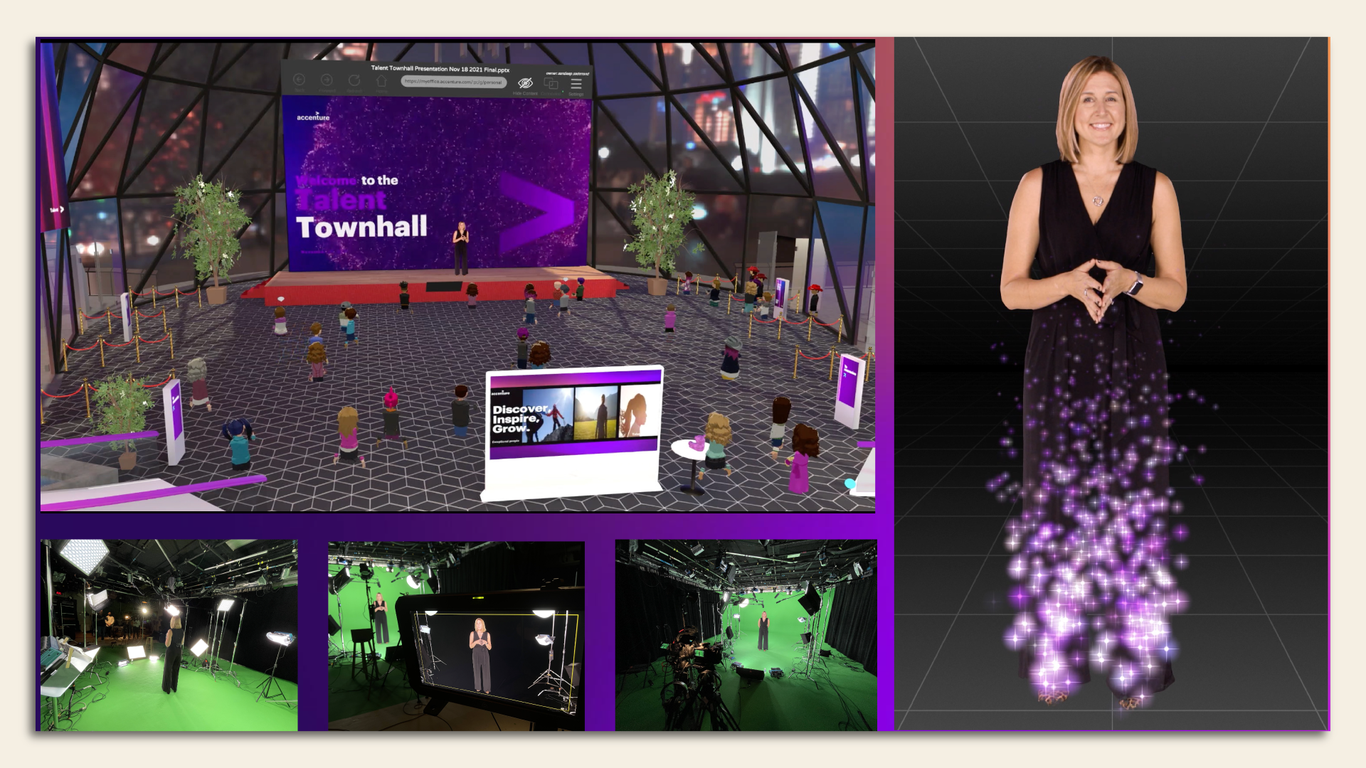Accenture CEO Julie Sweet made waves when she banned the corporate memo. Now she’s communicating with her employees in the metaverse.
Why it matters: By 2024, the metaverse could be an $800 billion opportunity — and embracing this new channel of communication could be key to remaining competitive and relevant.
Zoom in: Accenture immediately establishes its company culture by including virtual reality headsets in each new hire’s welcome bag. From there, employees are onboarded and trained at Accenture’s virtual office.
- The idea is rooted in learning science, which shows that immersive learning — like training sessions in the metaverse — increases retention by more than 75%.
However, it does take some getting used to. Most Accenture employees need an average of five visits before feeling comfortable enough to embrace the experience.
- But the consulting firm is leaning in and recently launched an entire business group focused on the metaverse.
State of play: Jensen Huang, president and CEO of the software company Nvidia, says there’s a case for conducting manufacturing and logistics simulations in the metaverse too, telling CNBC it could reduce waste and save billions of dollars.
Zoom out: Alex Herrity, co-founder of the augmented reality platform Anima, thinks forcing the metaverse into the workplace could taint some users’ experiences.
- “The way the metaverse emerges is by starting with fun,” he told Axios. “There’s a reason why people often point to video games as the blueprint for what this more integrated, digital-physical life could look like — and I think starting with work is likely to get people to reject it fully.”
State of play: Brands are keeping it fun by offering unique experiences like Nikeland, OKCupid’s Gay Pride parade, Degree Deodorant’s “metathon” — a virtual marathon created for people with disabilities— or the upcoming metaverse music festival featuring Ozzy Osbourne.
Get smart: While the business case for the metaverse is compelling, coherently explaining it to investors, employees and consumers is a major hurdle.
By the numbers: 60% of U.S. adults can’t define the metaverse, according to a 2022 Axios|Momentive poll. However, tech experts say it’s coming, whether or not it’s understood.
- Pew Research Center and Elon University’s Imagining the Internet Center found that 54% of experts expect the metaverse to be a “fully-immersive, well-functioning aspect of daily life” by 2040.
- And users in emerging countries are most excited about this technology, the World Economic Forum found.
- More than two-thirds of people in China, India, Peru, Saudi Arabia and Colombia say they feel positive about engaging in the metaverse, compared to less than one-third in Japan, Great Britain, Belgium, Canada, France and Germany.

Yes, but: There are some things to consider before pitching metaverse experiences to your boss, colleagues or clients.
- It’s still not a thing. The metaverse as it exists now is still very decentralized, with different hosts — like Meta, Epic Games and Decentraland. The concept of an interconnected virtual world is cool, but it’s still very much a concept.
- We’ve (kind of ) seen this fad before. Second Life was the virtual world du jour in the early 2000s and brands like Adidas, Dell and Circuit City paid big bucks to have a presence across the platform.
- While Second Life still has about 1 million users, it lacks the major tech backing that the metaverse has.
- Meta’s issues. The most vocal backer, Meta, is getting a lukewarm reception in the virtual world.
- According to The Wall Street Journal, only 200,000 users are visiting Horizon Worlds on a monthly basis and “only 9% of worlds built by creators are ever visited by at least 50 people. … Most are never visited at all.”
- Horizon Worlds is currently “on ‘lockdown,’ meaning it is pausing the launch of new features until it improves the current user experience,” the Journal reports.
- The digital divide could grow deeper, leaving more people behind.
- “In the U.S., there are 47 million people that are offline and 18 million households have access to internet but can’t afford it,” says Karen Baker, president of Boathouse. “And communities of color are impacted the most.”
- And yet, according to a Morning Consult study, most Black and Hispanic adults (52%) are interested in entering the metaverse — far ahead of the 34% of white adults who said the same.
- Privacy concerns. Because of its decentralized nature, regulations around online safety and data collection are implemented and enforced on an ad hoc basis.
The bottom line: There’s a lot of hype around the metaverse, but before diving in head first, it’s up to communicators to better understand how this new channel can help leaders, employers and brands better connect with stakeholders in a productive way.
Read More: news.google.com









 Bitcoin
Bitcoin  Ethereum
Ethereum  Tether
Tether  XRP
XRP  USDC
USDC  Solana
Solana  TRON
TRON  Dogecoin
Dogecoin  Cardano
Cardano  Lido Staked Ether
Lido Staked Ether  Wrapped Bitcoin
Wrapped Bitcoin  LEO Token
LEO Token  USDS
USDS  Toncoin
Toncoin  Chainlink
Chainlink  Avalanche
Avalanche  Stellar
Stellar  Shiba Inu
Shiba Inu  Sui
Sui  Hedera
Hedera  Wrapped stETH
Wrapped stETH  MANTRA
MANTRA  Bitcoin Cash
Bitcoin Cash  Litecoin
Litecoin  Binance Bridged USDT (BNB Smart Chain)
Binance Bridged USDT (BNB Smart Chain)  Polkadot
Polkadot  Ethena USDe
Ethena USDe  Bitget Token
Bitget Token  Hyperliquid
Hyperliquid  WETH
WETH  WhiteBIT Coin
WhiteBIT Coin  Pi Network
Pi Network  Monero
Monero  Wrapped eETH
Wrapped eETH  Dai
Dai  sUSDS
sUSDS  OKB
OKB  Uniswap
Uniswap  Aptos
Aptos  Pepe
Pepe  Coinbase Wrapped BTC
Coinbase Wrapped BTC  Gate
Gate  Tokenize Xchange
Tokenize Xchange  NEAR Protocol
NEAR Protocol  Ondo
Ondo  Internet Computer
Internet Computer  Mantle
Mantle  Cronos
Cronos  Ethena Staked USDe
Ethena Staked USDe